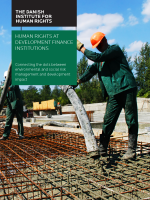
Human rights at development finance institutions
Development finance institutions (DFIs) are unique investors. As state-owned or state-supported institutions, they have a mandate to provide loans, equity and guarantees to the private sector in low- and middle-income countries. The strong focus on leveraging private finance in the 2030 Agenda and Addis Ababa Action Agenda has enhanced the role of DFIs and created opportunities for portfolio expansion.
The discussion paper posits that many DFIs have approached human rights and the 2030 Agenda in a relatively disjointed manner. While the sustainable development goals (SDGs) have been incorporated as a cross-cutting, strategic agenda centred on positive developmental impacts, human rights tend to be more narrowly interpreted as a compliance agenda focused on screening for and managing negative impacts on workers and communities. This disconnect in approaches falls short of acknowledging the developmental impact and value additionality of human rights due diligence and might make DFIs less prepared to prevent human rights harm or reap the development benefits of safeguarding human rights.
The discussion paper suggests four pathways DFIs can follow to better connect the dots between two internal functions, i.e. development impact and environmental and social risks management, with a critical role in SDG and human rights realisation.
The paper will be relevant to DFIs, international and national policy makers working with the development finance agenda, as well as civil society organisations working at the intersection of the SDGs, human rights and business. A secondary audience includes impact investors and investors aiming to increase Environmental, Social and Governance (ESG)-aligned investment.
We strive to make the pdf versions of our publications etc. accessible for screen readers. If you experience any problems, please contact Digital Editor Stine Juhl Nielsen on stni@humanrights.dk
